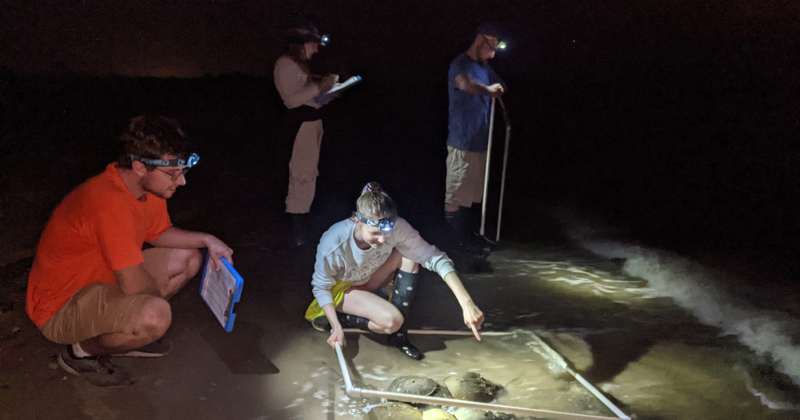
Category: Earth, Ocean and Environment

Ocean Currents
May 18, 2022 Written by Adam Thomas
In the middle of the night, during the evening high tide during and around the new and full moons in May and June, Delaware Sea Grant’s Kate Fleming can be found at Big Stone Beach in Milford, Delaware conducting a spawning survey for horseshoe crabs.
Along with a group of community scientist volunteers, Fleming, coastal ecologist for Delaware Sea Grant, conducts the spawning survey to determine the spawning ratio of male to female horseshoe crabs.
“It’s important that there are multiple males on the beach for every female to ensure that all of the eggs that she’s laying can be fertilized,” said Fleming. “The science shows that sometimes those males that haven’t managed to attach to a female are still successful in fertilizing the majority of eggs in a nest. So it’s important that there are lots of males on the beach for every female on the beach and that is what we’re looking to document for fisheries managers through the spawning surveys.”
The spawning surveys, as well as the importance of horseshoe crabs overall, will be the topic of Fleming’s Ocean Currents lecture from 7 p.m.-8 p.m., Thursday, May 19, titled “Why and How We Count Horseshoe Crabs.”
This is the first talk in the 2022 Ocean Currents Lecture Series, sponsored by UD’s College of Earth, Ocean and Environment and Delaware Sea Grant. For the first time since 2019, some of the Ocean Currents lectures will be in-person on UD’s Hugh R. Sharp Campus in Lewes (and live-streamed on zoom), while others will be virtual only. All of the events are free and open to the public, featuring one-hour in-depth presentations on the interesting and impactful work and research of faculty and staff.
In addition to Big Stone Beach, the Delaware Bayshore has about two dozen horseshoe crab survey sites with a number of collaborating organizations coming together to conduct the spawning surveys at the various sites. These data collected across the region are provided to fisheries managers who are tasked with setting harvest limits for this species.
Fleming said that horseshoe crabs are an interesting marine resource that are both ecologically important and beneficial for humans through several uses.
“Horseshoe crab eggs provide an important prey resource for our imperiled shorebird species that visit our beaches each spring,” said Fleming. “Migratory shorebirds like semipalmated sandpipers, sanderlings and the federally threatened red knot all feed on horseshoe crab eggs.”
Horseshoe crabs are important as a bait resource. Local fisheries use horseshoe crabs to attract American eel and whelk.
The biomedical industry also uses horseshoe crabs. Horseshoe crab blood has properties in it that allows experts to isolate bacteria. Medical industry professionals use the limulus amebocyte lysate test to evaluate the safety of medical instruments.
“Things like vaccines and pharmaceutical injectables and surgical implants, they’re all tested using horseshoe crab blood to make sure they’re safe,” said Fleming. “There’s a lot of different benefits of horseshoe crabs and a number of factors pulling at their populations, and so that’s why they are managed closely.”
The Ocean Currents lecture series will feature faculty and staff of the University of Delaware and Delaware Sea Grant on Thursday nights every other week during the summer, starting at 7 p.m. and running for about an hour. Speakers will present their research and expertise surrounding topics in environmental sciences with everyday impacts on everyone.
To register for Fleming’s talk and any future Ocean Currents lectures, visit:https://ud.alumniq.com/index.cfm/events:register/home/eventId/8273
Future Ocean Currents Lectures include:
June 2: "Microbial forensics: dissecting environmental processes through DNA" presented by Jen Biddle, professor, School of Marine Science and Policy.
June 16: “The tiniest architects on Earth: How microbes make minerals" presented by Clara Chan, professor, Department of Earth Sciences.
June 30: "Tidal Salt Marshes in the Anthropocene: Ecosystem Services, Habitat Degradation, and Restoration Efforts" presented by Andrew Wozniak, assistant professor, School of Marine Science and Policy.
July 14: "Global Vegetation in a Changing Climate" presented by Pinki Mondal, assistant professor, Department of Geography and Spatial Sciences.
July 28: "Pollution in the Ocean" presented by Mi-Ling Li, assistant professor, School of Marine Science and Policy.
August 11: Supply Chain Challenges to Our Food System" presented by Kyle Davis, assistant professor in the Department of Geography and Spatial Sciences.
August 25: "Earthly Order: Systems Science and 21st Century Challenges" presented by Saleem Ali, chair of the Department of Geography and Spatial Sciences — with book signing and Ocean Currents series reception to follow.
For event inquiries, please email markjvb@udel.edu
For registration assistance, please email alumnet@udel.edu
